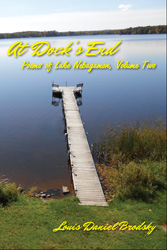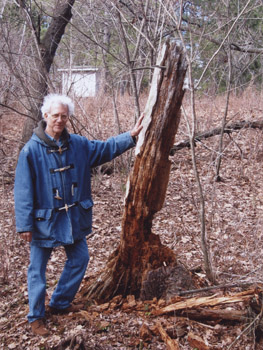

At Dock's End
Poems of Lake Nebagamon, Volume Two
Paperback: 152 pp.
Published: 2011
Price: $15.95
BUY THE BOOK from Amazon.com
Selected by Chamber Four (chamberfour.com)
as one of the Best Books of 2011
Praise:
Like Wordsworth, Whitman, and Frost,
Brodsky evolves complex meditations on the relation of individual mind
to nature, memory, and its own perceptions. Yet he is always himself. As
he writes, in one of the most striking poems, "It's all about getting
back to the things of this world." Brodsky delivers that, and more.
— George Bornstein, Professor Emeritus of English, University of Michigan, and author of many scholarly books, including The Colors of Zion: Blacks, Jews, and Irish from 1845 to 1945
Louis Brodsky has tapped
into the heartwood of the North Country and shares, with us, the
treasure he has found. He is a lucky man. He has a place in the woods up
north. Now, thanks to the gift of his verse, the rest of us do, too.
— Sam Cook, outdoors writer, Duluth News Tribune, and author of Up North, Friendship Fires, Quiet Magic, and Camp Sights
Perhaps the only thing as dear to
Louis Daniel Brodsky as the beauty of the written word are his memories
and experiences on the shores of Wisconsin's Lake Nebagamon, which the
poet describes as "glory's hinterlands." The combination of his two
passions is a wonderful example of the poetry of place — the
kind of soul-forming and life-affirming locale that we all have
somewhere in our lives. What the open road was to Whitman, the North
Woods are to Brodsky.
— Brad Herzog, author of Turn Left at the Trojan Horse
Louis Daniel Brodsky's new collection of poems, At Dock's End: Poems of Lake Nebagamon, Volume Two,
is a poetic journal of one man’s sojournings in the woodlands of Lake
Nebagamon, in northern Wisconsin. Brodsky shows us, amidst the stress
and noise of modern urban society, that man needs to return to the
solitude of nature, in order to restore his soul. Like Thoreau at Walden
Pond and Wordsworth in northwestern England's Lake District, Brodsky
finds, in the beauty of a lake and its surroundings (in this case, Lake
Nebagamon), the healing grace and tranquillity of nature. "Everyone
should have a lake in the valley of his soul," Brodsky teaches us, and
for those of us not fortunate enough to have experienced such a sojourn,
these poems make such a lake come alive. Through reading this book,
each one of us can immerse himself both in Lake Nebagamon and in the
lake of the imagination and be assured that "what once was, and is, must
unendingly be." This book of poems is highly recommended.
— Yakov Azriel, author of Threads from a Coat of Many Colors: Poems on Genesis and In the Shadow of a Burning Bush: Poems on Exodus
Louis Daniel
Brodsky's poetry is an antidote to our plugged-in society. Once exposed,
as a child, to the beauty and solitude of the North Woods, Brodsky was a
goner. He's returned often, as an adult, spending weeks, in solitude,
in a cabin at the shore of his beloved lake — and his poems shine with
the glory of it all.
— Nardie and Sally Stein, former directors of Camp Nebagamon for Boys
While Louis Daniel Brodsky is nowhere near the end of his creativity, it is true that with the publication of At Dock's End,
he will be reaching his three-score and ten, and he has certainly
achieved a kind of wisdom that is evident throughout this collection.
Indeed, as he writes, in "Time Telling," the second poem of the
collection:
By now, grown old, at sixty-eight,
While well realizing I'm a mere sapling, in nature's eyes,
What I've come to understand, if anything wise,
Is that existence and its ubiquitous coeval
Are measured not by the beacon-light sweep of a secondhand
But in seasons, cycles, phases, footfalls, and breaths, . . .
Brodsky has been called a modern Thoreau, a twenty-first-century Whitman, and these poems bear that claim out, in their description of and reverence for the natural world and a man's place in it. At Dock's End continues the contemplation of Lake Nebagamon, in Wisconsin, begun in At Water's Edge — and, even before that, in You Can't Go Back, Exactly — and how the generations overlap in a cyclical fashion, within the context of the vast timelessness of nature. Brodsky captures this timelessness in his descriptions of the woods, the lake, the storms, yet against this background, he shows us the poignance of the comparatively brief life of a man, and therein lies the wisdom of the work.
Whereas the poems in At Water's Edge take place in autumn, At Dock's End begins in the spring and plunges headlong, through the year, past the summer residents and celebrations that flare and fade, returning to the cozy, contemplative melancholy isolation of fall and the stark reality of the cold, snow-heavy winter, at the end of the year, when all lies dormant. But just as Shelley wrote, in "Ode to the West Wind," "If winter comes, can spring be far behind?" so Brodsky points, at the end of the collection, to yet another season in the endless natural cycle of the woods and the lake, and to another volume of poetry in this remarkable series:
At this rate, by late April, when the ice should be melted,
Or at least as mid-May green awakens around the lake,
I'll be able to walk out on my dock again . . .
Yet the winter is also beautiful. Indeed, in his descriptions of color and scene across the half-year span this collection embraces, Brodsky brings alive the overwhelming beauty of the woods and the lake, in poems like "Early-Morning Swim," "July Light," "Spiral Heights," "The Things of This World," and dozens of others — the entire third and fourth sections ("The Stars, the Clouds, and the Lake"; "Sunrises and Sunsets"). "Snowshoeing into Christmas Eve," from the final section, begins:
This exquisite blizzard began at midnight.
Now, another six to eight fluffy inches of powder,
Accumulated on top of the nine or so fallen a week ago, . . .
It is exquisite. Or take this line, from "Snow Spirits":
The iced-over, snow-covered lake is faceted with fire, . . .
The beauty is almost palpable.
To read Louis Daniel Brodsky's poetry is to unlock an interior meditation within us all . . . if only we can listen for it.
— Charles Rammelkamp, author of Castleman in the Academy, The Book of Life, The Secret Keepers, and Go to Hell
At the end of the first decade of
the twenty-first century, when technology and postmodern crises loom
large, Louis Daniel Brodsky pauses to listen to silences, to look at
horizons, and to speak to senses. In clear and comforting sounds, he
forces us to remember not tranquillity but the multitudes of life, the
vicissitudes that assault us and from which poetry, as a practice of
space, rescues us. This is nature poetry for our age and a seer's
clairvoyant vision, from Lake Nebagamon, which, in calming our everyday
lives, amidst this century's tumultuous fractures, reminds us of Walden
Pond and Thoreau's best contemplations.
— Thadious M. Davis, author of Games of Property: Law, Race, Gender, and Faulkner's Go Down, Moses and Nella Larsen, Novelist of the Harlem Renaissance: A Woman's Life Unveiled
A dock is a passageway to many things: to a boat; to feed oneself with fish; for sports; or simply to reflect on the massive nature of the world. At Dock's End: Poems of Lake Nebagamon, Volume Two is a collection of poetry from Louis Daniel Brodsky, as he continues to wax philosophical and poetic, looking out on his favored lake, with many thoughtful ideas. At Dock's End is an excellent second offering, very much recommended.
— Midwest Book Review
BUY THE BOOK from Amazon.com
Four Hundred Fifty or So Paces
On this final morning of my five-day stay
In this gorgeous North Woods land of my renascence,
I make one more trek, four hundred fifty or so paces,
From my rented cabin, on the town-side shore of the lake,
Down to the boys’ camp, yet living in my past,
To commune with the shadows of my future.
Once inside the back gate,
I’m inundated by the dense scent of freshly greening trees,
Beckoning me into these coverts, to remain forever, if I desire.
But I only have time, today, for an abbreviated circuit,
A brief reading of nature’s legendary epic,
To remind myself how tied I am to its beauty and solitude.
Amidst all these empty cabins, paths, spaces,
I listen, intently, for whispers from resident spirits,
Who might be calling me to return to childhood.
Gradually, the silence transforms itself into one voice:
A ubiquitous symphony, on the air,
Being performed, by songbirds, for me alone.
Leaving these woods predisposes my soul to melancholy,
Yet I know why my stay is necessarily evanescent.
Other designs are waiting to shape my destiny,
Among which are two flights I must take, before twilight,
Another pillow upon which to lay my head,
In a city apartment far from cabin and waves.
Now, I’ve gathered my four hundred fifty or so paces,
Each a steppingstone I’ve placed in my pockets,
In case sleep beckons my dreams back to Lake Nebagamon.
Click here to read an article written about the Lake Nebagamon Trilogy.
